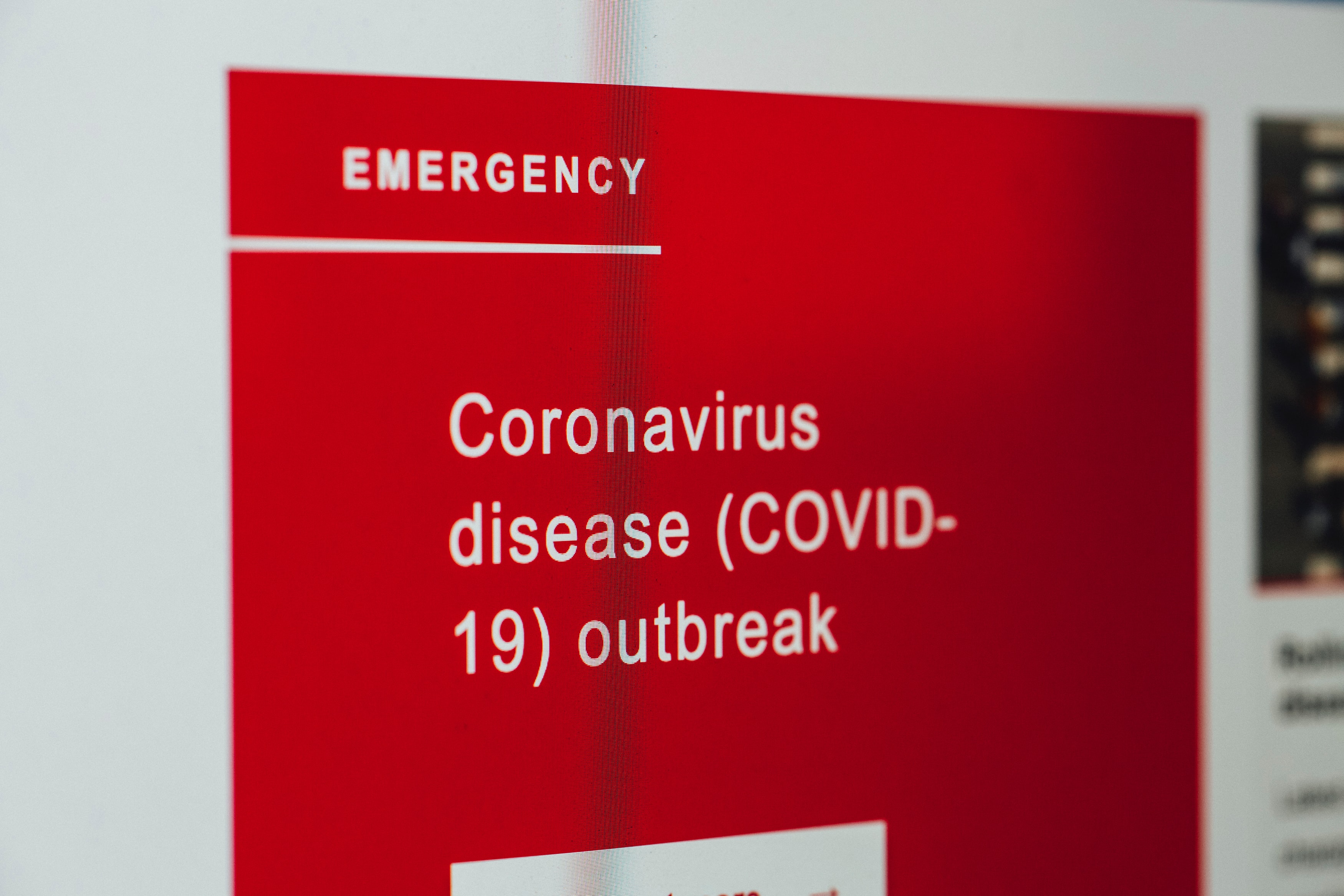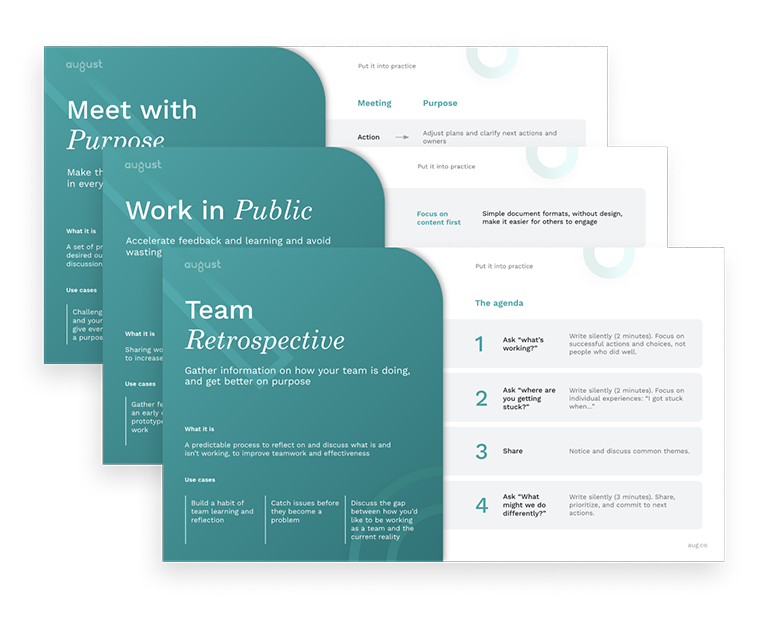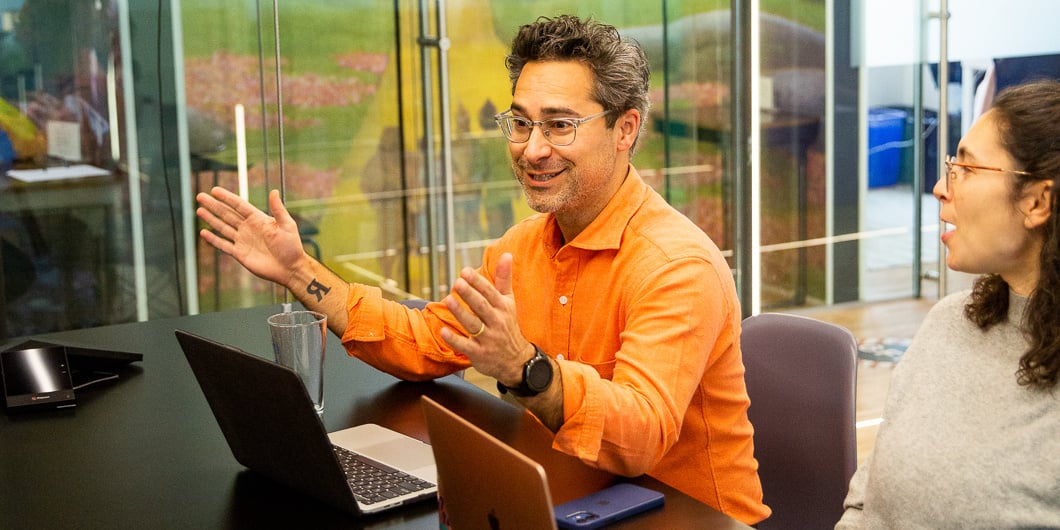Published March 19, 2020 | Updated June 5, 2020 | 9 minute read
Amy Edmondson, Professor of Leadership and Management at the Harvard Business School, author of The Fearless Organization, and advisor to August Public Inc., sat down for a short interview with August Co-Founder Mike Arauz to share her advice and wisdom.
Recorded Tuesday, March 17, 2020.
Mike: So just really quickly, for those who maybe have heard the term psychological safety, but maybe could use just a little bit of a refresher, what is psychological safety?
Amy: I think the easiest way to say what it is is that it's, that it's candor, it's directness, but it's really the the experience of feeling able to be candid to be direct. We've all had moments at work and elsewhere where we have something to say, but we feel unable to say it. That might be because it's bad news, or it might be because we lack confidence and its value, and so we hold back. So that's the experience of psychological safety, I think is really important at work, but not to be taken for granted.
Mike: How have you been looking at this moment and this challenge that everyone is facing through that lens?
Amy: In any kind of hierarchy the natural inclination is to not want to share bad news up the hierarchy. I think there's certainly evidence of this in [Washington] D.C. um - there's a great deal of evidence of people just being reluctant to cope with the consequences, interpersonally or organizationally, of delivering bad news up the chain of command, which leads delays in reaction time.
This true in the COVID-19 situation, but it's true in many organizations whereby the delay in sharing bad news from the places where they're aware of and close to the data to the people in positions of authority to do something about it, creates much bigger problems.
One big theme is to try to minimize delays through transparency, through openness. And I would argue that won't happen unless the steps are put in place to create psychological safety [by] letting people know that not only is it okay to share bad news, it's incredibly problematic when you don't. In fact, if there's going to be sanctions or negative consequences from people in positions of authority, it ought to be when they learned that things weren't shared in a timely way.
I think another angle on psychological safety right now is just the, the tremendous fear people are feeling widely about what comes next. Psychological safety and fear are opposites, right? So if you're in a state of fear, you're not in a state of psychological safety. And so you might think, well, there's nothing you can do about that fear. And I think that's true: We should and will be afraid right now. But what you can do is make sure that fear is discussable. It's shared. I think being alone and afraid is terrible. But being in a social distancing community that's afraid and sharing your thoughts and keeping people's spirits high is a much less worse proposition.
Mike: On that note one of the things that we're hearing a lot of folks kind of wrestle with and talk about people are, I'm physically alone. A lot of people are dealing with tremendous uncertainty and fear both in their personal lives and their professional.
From a leader's perspective, what is the value of creating space to talk about those bigger challenges and fears, even if it might seem that that stuff is kind of separate from the work that needs to get done?
Amy: I think the value is immense. I think good organizations right now are doing this kind of a constant meaning daily updating: “This is what we know.” I think a best practice is to say also what we don't know and what we're doing. That reliable routine of knowing that you will get some kind of update gives people something to hang on to. Then there is the value of creating spaces where people can talk about and share the small things they're doing, to either pass the time or reduce their family’s worries is I think very valuable indeed.
I think we all know that you're working alone without, you know, without interruptions, without colleagues. On the one hand, the day is longer, right? In theory, there’s room to get things done. But in practice, it's very hard to just sit still at work the whole time, especially under conditions of anxiety.
So we need to create virtual water coolers. You know, those, those sanctioned moments where we're all gonna get on some medium and talk about what we had for lunch. No real agenda, but just the normal, the normal kinds of breaks that we would have if we were face to face. There’s certainly been many people who have worked from a distance for years, but I think a lot of people haven't done that or and are learning how hard it is.
Mike: What is the relationship between a sense of belonging and being able to navigate it?
Amy: Without a whole lot of data my hypothesis would be it's a very strong relationship: I think a sense of belonging a must have a critical psychological input to be able to confront the challenges that lie ahead.
Mike: So much of your research and expertise is in the health care space. When you're thinking about hospitals & healthcare professionals, how do you think about how their ways of working are serving them in a moment like this? And what can other organizations and leaders learn from them?
Amy: We all need to be thinking about how to support the healthcare providers who are working already working longer hours than unusual. And there's a hundred percent chance that people who are working right now are going to end, are going to get sick and are going to have to step down and others are going to be called in, who maybe haven't taken care of patients for a while. I mean, there's going to be a lot of churn and a lot of need for heroics and therefore a lot of need for the rest of us to do our part. Being caring and helpful where we can be. We're not anywhere near where the worst of it will be.
Mike: You have talked a lot about how important it is for people to be able to contribute regardless of who they are or where they sit in an organization that helps an organization to be more adaptive and responsive. What are some of the kind of practical things that exist maybe in a hospital or healthcare setting that make that a little bit easier or more
Amy: There are norms and guidelines for, for, for quick interactions, you know, in any kind of teaming. A situation, which is people working together to accomplish shared aims across boundaries, expertise, requires being very deliberate, very thoughtful, you know, really clear, coherent communication: “Here's what we know. Here's what I'm doing. Here's what I need to tell you. What questions do you have?”
That sounds like it could take a long time. It doesn't have to, these can be very deliberate, thoughtful and careful exchanges of information and questions just to get up to speed quickly. On calls, make sure to introduce yourself. Don't assume we all know each other. Introduce yourself and what you've been doing.
Mike: I've heard you use the language before about creating a learning frame, right? In a situation and talking openly about the things that you don't know. In a moment like this, I think a lot of leaders struggle even more than normal to maintain that learning frame for themselves and their team. How do they do that? What should they be saying?
Amy: Paradoxically, the learning frame is needed. More than ever, and quite literally, we've never been in this situation before, right? Oftentimes we say something like that, but we've been in pretty similar situations. None of us have been in this situation before and so that necessitates a learning frame.
That’s not the default, and under stress, it becomes even less the default. Be explicit about creating it. Creating the learning frame means saying “Hey, we don't know what's next We've never been in a situation before. We will be learning as we go. We need your help, need your input, need your questions, need your observations. Please speak up about things that might not even seem to you necessarily important at the time, but they might be, none of us really know.”
Mike: I think that's not only acknowledging what we don't know, but really saying, speak up about things, say things even if you're not sure if they'd be valuable. I want to hear about it because we don't know what might be valuable to us as we navigate.
Amy: Navigate is a good word because essentially we have a rough short charter and a rough map, but not a very good one. We're going to be trying things and we need to remain open and attentive to what the phenomena say back to us. And so the learning frame starts with recognition that we don't know. We're going to try to find out. We're going to act the best we can and then continues with enormous sensitivity to the data of the experiences we have. It's as if we're all scientists. All of a sudden where we have hypotheses, we take action to test the hypotheses. We're collecting the data. It will let us know. How right or wrong the hypothesis was, and then we use that data to kind of rethink and tweak or alter course as needed.
Mike: One other piece of the fear is around uncertainty. It's a lot about economic uncertainty and, and business performance, uh, fears about business performance, taking a downturn in a lot of industries - that's already has happened.
What can leaders do to mitigate the impact of that, that economic and financial uncertainty, the impact of that on their employees?
Amy: You know, there's no easy answer or there's no single answer. I think the question right now is best answered that they need to think about it. You have to create communities that are going to do the best they can to support each other and feed each other and take care of each other. The same principle is: “This is what we know. This is what we hope to do. We cannot know exactly how long this is going to go, or what, what impact it's going to have.”
And of course, sharing the burden and sharing the pain. The one absolutely unacceptable thing to do is to have some people, and especially those at lower levels and lower paid levels pick up all of the burden.
Mike: If you were coaching a leader, they're about to walk into their next team meeting. Um, you know, they're next big moment what should they say to their teams, beyond all the traditional wisdom?
Amy: I mean, I think just be real, be genuine, acknowledge your own fear, your own humility and fallibility and invite others to do the same. In some sense, the real job of leaders here is to be cognizant of reality as best we understand it right now. Find some ways, no matter how small, to create hope, to paint a picture that we will get through this. And in fact, we'll get through it because we're strong and because we're working together.
The message is one of “Yeah, I get it. I see reality. We see reality and we have to believe in sort of hopeful outcome eventually, and we'll get there. I'm certainly going to be a lot more likely to get there by teaming up and working together and being candid and supporting each other and especially supporting the people who are going to be feeling a lot more pain and anxiety than others.
The degree to which you can ask yourself “What can I do to help? How can I contribute?” is going to be far more powerful than dwelling on “What have I lost?” and “What do I wish hadn't happened?” I mean, that kind of thinking is natural and human, but not, not terribly helpful.
Last week my students learned that classes would be canceled going forward and it would be all moved online. They're all disbanding to all over the world, and there are just so many questions. Of course, we had very few answers and they worry about themselves, their careers and they worry about their social cohesion.
All you can do is ask yourself “How can I help? How can I help mitigate the academic experience so that the lessening that we will have by not being in one classroom together is as small as it can be?” [00:19:28] To pay attention and to keep my colleagues paying attention and related to careers is going to be stuff, you know, how do I accept the things I cannot change? Uh, you know, maybe that summer job you had for the airline isn't going to come through. Or maybe it is, but in the meantime, you know, , how do I cope with that and how do I help some of my colleagues who might be even worse shape to cope with that?
Mike: If folks want to dig deeper on any of this stuff, um, what do you recommend that they check out?
Amy: I had a recent, HBR article on about understanding that bad news is not comfortable or easy it's really important and powerful. And then all of this work on psychological safety and teaming is much more elaborated in, in my two books. One is called The Fearless Organization, and the other is called Teaming.
Mike: Thank you so much. Take care. Be safe.
Amy: Okay. Yeah. You too.


.jpg)






